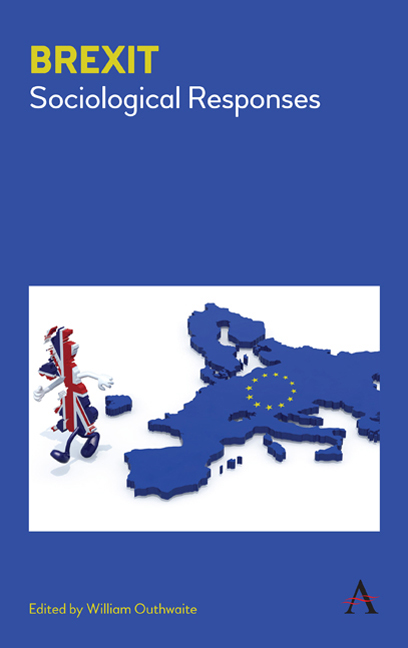Book contents
- Frontmatter
- Contents
- Preface
- Section 1 HOW DID IT HAPPEN?
- Section 2 THE POLITICS OF BREXIT
- Chapter Five Populism, Nationalism and Brexit
- Chapter Six A Tale of Two Constitutions: Whose Legitimacy? Whose Crisis?
- Chapter Seven Locating Brexit in the Pragmatics of Race, Citizenship and Empire
- Chapter Eight Globalization, Nationalism and the Changing Axes of Political Identity
- Chapter Nine A Divided Nation in a Divided Europe: Emerging Cleavages and the Crisis of European Integration
- Section 3 PROSPECTS FOR/ AFTER BREXIT
- Notes on Contributors
- Index
Chapter Nine - A Divided Nation in a Divided Europe: Emerging Cleavages and the Crisis of European Integration
from Section 2 - THE POLITICS OF BREXIT
Published online by Cambridge University Press: 10 January 2018
- Frontmatter
- Contents
- Preface
- Section 1 HOW DID IT HAPPEN?
- Section 2 THE POLITICS OF BREXIT
- Chapter Five Populism, Nationalism and Brexit
- Chapter Six A Tale of Two Constitutions: Whose Legitimacy? Whose Crisis?
- Chapter Seven Locating Brexit in the Pragmatics of Race, Citizenship and Empire
- Chapter Eight Globalization, Nationalism and the Changing Axes of Political Identity
- Chapter Nine A Divided Nation in a Divided Europe: Emerging Cleavages and the Crisis of European Integration
- Section 3 PROSPECTS FOR/ AFTER BREXIT
- Notes on Contributors
- Index
Summary
Introduction
The startling result of the referendum of June 23, 2016, at first defies explanation. How could a relatively prosperous country with a fairly stable state system act against its economic and political interests? Do people willfully act against their interests? Do they even know what their interests are? The Brexit phenomenon has been widely viewed as the biggest crisis for the UK since 1945. In bringing the country to the brink of a crisis of governability and marking a new milestone in the history of the post– World War II project of European integration, it has also brought about a new political context, in which the populist anti- immigration Right has made large gains, and a climate of considerable political uncertainty as well as economic decline. The circumstances by which the referendum was set up are of course the primary causal factors in accounting for Brexit, as are the failure in political leadership in allowing a referendum to take place on a complex issue that referenda are ill- equipped to deal with. Brexit is also an interesting sociological case study of major societal change and institutional transition.
The aim of the present chapter is to explore the sociological ramifications of the referendum, which I argue is hugely significant. The fact that the outcome with a narrow majority of approximately 1.2 million could easily have gone the other way— that is, if just over 640,000 had voted remain— does not detract from that the fact that 17.4 million voted leave (51.9 percent). In fact, the narrow split— 51.9 percent against 48.1 percent— has served to enhance the magnitude of Brexit, which if implemented will entail major change and impose the will of one- half of the population on the other. Referenda, unlike elections, are not just cases of simple majorities determining outcomes. There are many reasons why this is the case, and it is not the aim of this chapter to examine the constitutional questions that Brexit raises (see the chapters by Chris Thornhill and Antje Wiener in this volume), but one point must be noted: election outcomes are reversible at the next election. Referenda generally are not reversible, however, and in the case of Brexit a more or less irreversible systemic course of action will ensue that will almost certainly set the historical clock back by several decades.
- Type
- Chapter
- Information
- BrexitSociological Responses, pp. 111 - 124Publisher: Anthem PressPrint publication year: 2017



